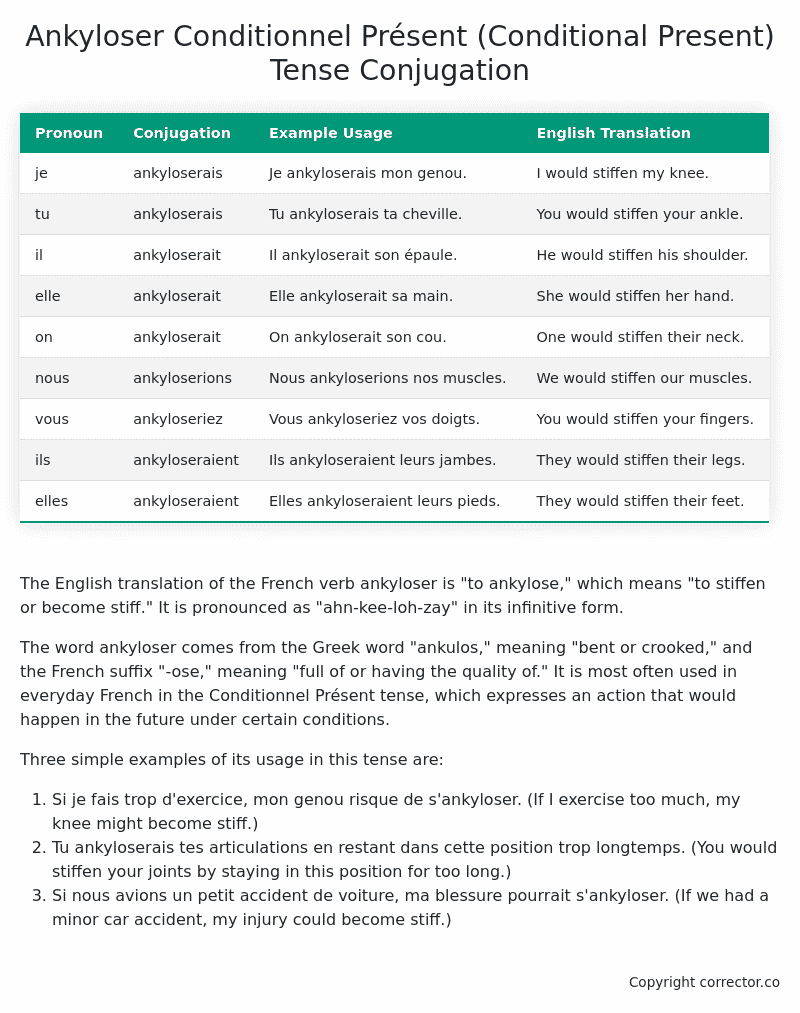Conditionnel Présent (Conditional Present) Tense Conjugation of the French Verb ankyloser
Introduction to the verb ankyloser
The English translation of the French verb ankyloser is “to ankylose,” which means “to stiffen or become stiff.” It is pronounced as “ahn-kee-loh-zay” in its infinitive form.
The word ankyloser comes from the Greek word “ankulos,” meaning “bent or crooked,” and the French suffix “-ose,” meaning “full of or having the quality of.” It is most often used in everyday French in the Conditionnel Présent tense, which expresses an action that would happen in the future under certain conditions.
Three simple examples of its usage in this tense are:
- Si je fais trop d’exercice, mon genou risque de s’ankyloser. (If I exercise too much, my knee might become stiff.)
- Tu ankyloserais tes articulations en restant dans cette position trop longtemps. (You would stiffen your joints by staying in this position for too long.)
- Si nous avions un petit accident de voiture, ma blessure pourrait s’ankyloser. (If we had a minor car accident, my injury could become stiff.)
Table of the Conditionnel Présent (Conditional Present) Tense Conjugation of ankyloser
| Pronoun | Conjugation | Example Usage | English Translation |
|---|---|---|---|
| je | ankyloserais | Je ankyloserais mon genou. | I would stiffen my knee. |
| tu | ankyloserais | Tu ankyloserais ta cheville. | You would stiffen your ankle. |
| il | ankyloserait | Il ankyloserait son épaule. | He would stiffen his shoulder. |
| elle | ankyloserait | Elle ankyloserait sa main. | She would stiffen her hand. |
| on | ankyloserait | On ankyloserait son cou. | One would stiffen their neck. |
| nous | ankyloserions | Nous ankyloserions nos muscles. | We would stiffen our muscles. |
| vous | ankyloseriez | Vous ankyloseriez vos doigts. | You would stiffen your fingers. |
| ils | ankyloseraient | Ils ankyloseraient leurs jambes. | They would stiffen their legs. |
| elles | ankyloseraient | Elles ankyloseraient leurs pieds. | They would stiffen their feet. |
Other Conjugations for Ankyloser.
Le Present (Present Tense) Conjugation of the French Verb ankyloser
Imparfait (Imperfect) Tense Conjugation of the French Verb ankyloser
Passé Simple (Simple Past) Tense Conjugation of the French Verb ankyloser
Passé Composé (Present Perfect) Tense Conjugation of the French Verb ankyloser
Futur Simple (Simple Future) Tense Conjugation of the French Verb ankyloser
Futur Proche (Near Future) Tense Conjugation of the French Verb ankyloser
Plus-que-parfait (Pluperfect) Tense Conjugation of the French Verb ankyloser
Passé Antérieur (Past Anterior) Tense Conjugation of the French Verb ankyloser
Futur Antérieur (Future Anterior) Tense Conjugation of the French Verb ankyloser
Subjonctif Présent (Subjunctive Present) Tense Conjugation of the French Verb ankyloser
Subjonctif Passé (Subjunctive Past) Tense Conjugation of the French Verb ankyloser
Subjonctif Imparfait (Subjunctive Imperfect) Tense Conjugation of the French Verb ankyloser
Subjonctif Plus-que-parfait (Subjunctive Pluperfect) Tense Conjugation of the French Verb ankyloser
Conditionnel Présent (Conditional Present) Tense Conjugation of the French Verb ankyloser (this article)
Conditionnel Passé (Conditional Past) Tense Conjugation of the French Verb ankyloser
L’impératif Présent (Imperative Present) Tense Conjugation of the French Verb ankyloser
L’infinitif Présent (Infinitive Present) Tense Conjugation of the French Verb ankyloser
Struggling with French verbs or the language in general? Why not use our free French Grammar Checker – no registration required!
Get a FREE Download Study Sheet of this Conjugation 🔥
Simply right click the image below, click “save image” and get your free reference for the ankyloser Conditionnel Présent tense conjugation!

Ankyloser – About the French Conditionnel Présent (Conditional Present) Tense
Formation
Common Everyday Usage Patterns
Expressing Polite Requests
Expressing Hypothetical Situations
Expressing Doubt or Uncertainty
Interactions with Other Tenses
Present Tense
Past Tense
Future Tense
Conditional Perfect
Summary
Want More?
I hope you enjoyed this article on the verb ankyloser. Still in a learning mood? Check out another TOTALLY random French verb conjugation!


